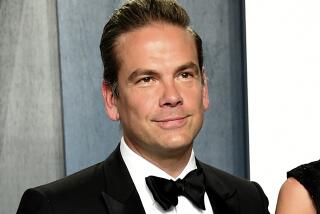But Chairman Probst to Retire : Sperry President Gets High Post at Merged Company
- Share via
Joseph J. Kroger, Sperry’s president who was believed to be a staunch opponent of his company’s merger with rival Burroughs, will become vice chairman of the merged company, Burroughs said Thursday.
But Gerald G. Probst, 62, Sperry’s chairman who led an unsuccessful effort to fend off the $4.8-billion merger of the computer makers, has decided to leave the company and will retire at the end of the year.
The announcement, industry analysts said, puts 51-year-old Kroger in the running to succeed W. Michael Blumenthal, 60, Burroughs’ chief executive--a position formerly believed the sole province of Paul G. Stern, Burroughs’ current president. Stern, 47, retains wide-ranging duties under the new structure.
Kroger, Stern and James R. Unruh, currently Burroughs’ executive vice president and chief financial officer, will join Blumenthal in a newly created executive office for the yet-to-be-named new company.
The changes are effective following the official completion of the merger. A Sept. 16 shareholders meeting has been set for the formal vote of approval.
Registers for Offering
Also, Burroughs said Thursday that it had registered with the Securities and Exchange Commission for a shelf offering of as much as $950 million in debentures.
Following the May 27 agreement to merge, Blumenthal said that both of Sperry’s top men would hold key posts in the new company--with Probst as vice chairman and Kroger as president of the Sperry unit. Although analysts said at the time that retention of top Sperry executives--Kroger, especially--would be necessary for a smooth merger, speculation was rife that neither Probst nor his heir-apparent Kroger would remain.
Analyst Michael Geran of E. F. Hutton in New York said the move was “logical, astute, intelligent and very rare that a merged company affords a senior-level job to the executive of the acquired firm. It shows that Blumenthal is still treating Sperry and its customers with tender loving care.”
Instead of retaining Stern and Kroger as heads of the separate divisions, the new alignment appears to capitalize on each’s distinct skills. Kroger, who began his 26-year career with Sperry as a salesman and acquired a reputation for strong marketing skills as he rose through the ranks, will run the sales and marketing operations of the new company.
Stern, known for his technical expertise, will assume responsibilities for day-to-day administration of technology, manufacturing and engineering for both companies’ distinct product lines.
Stern previously shared the executive office at Burroughs with Blumenthal.
New to that office is Unruh, who will be in charge of staff and planning operations.
Probst, who will be 63 next month, will serve on the board until year-end; afterward, Burroughs said, he is expected to serve as a “special consultant” to Blumenthal.
“I am grateful to Mr. Probst for his help in putting our two companies together. . . . I am glad (he) will continue to work closely with me as a consultant following his retirement,” Blumenthal said in a statement.
Burroughs also said that Edwin Gilbert, currently Sperry’s senior vice president of finance, will become vice president of finance and chief financial officer of the new corporation. Burroughs executive Curtis A. Hessler will continue as senior vice president for legal and corporate development.
A new name for the merged company and decisions relating to the consolidation of certain of the two companies’ staffs and facilities are expected to be announced this fall. Both companies said there had not been any defections at the executive level since the merger deal was made.
In the deal, Burroughs agreed to pay $76.50 in cash and securities for each share of Sperry stock. The cash portion of the payments has been made. In the second tier, Sperry shareholders are to get the equivalent of $30.60 in stock and in debentures carrying a 9.75% interest rate. Burroughs said that if interest rates were more favorable, its shelf offering could be used to raise cash to pay shareholders instead of the 9.75% debentures.
More to Read
Inside the business of entertainment
The Wide Shot brings you news, analysis and insights on everything from streaming wars to production — and what it all means for the future.
You may occasionally receive promotional content from the Los Angeles Times.










